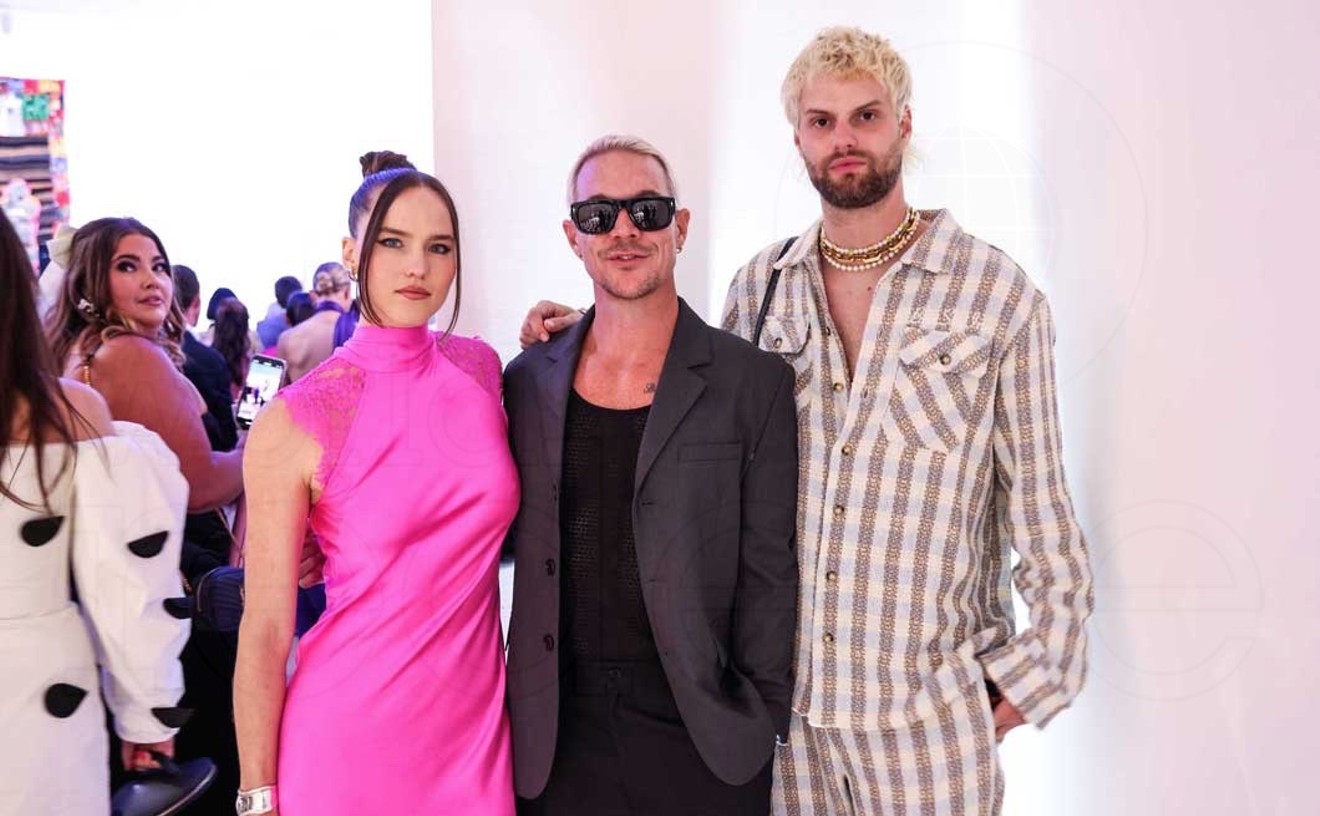It's not often one stumbles across a dishwasher full of dildos. But at the Museum of Contemporary Art in North Miami, familiar, everyday objects are recast in a darkly humorous way to remind us to put our assumptions as art viewers through the rinse cycle and reconsider quotidian aspects of life easily taken for granted.
The challenging show marks the first comprehensive U.S. museum exhibition for Paris-based collective artist Claire Fontaine and has been deftly curated by Ruba Katrib, MOCA's associate curator.
"Claire Fontaine: Economies" features sculpture, painting, neon, video, and text created from 2006 to the present, including several new pieces executed specifically for this show, some of which were inspired by Miami.
Claire Fontaine appropriated the name of a French paper company in 2004, calling herself a ready-made artist. Managed by "assistants," Fontaine's practice explores collaborative approaches to working and questioning possibilities for social change.
The artist's meditation on alternative value systems and contradictions regarding notions of ownership or a communal image depository bankrupt of originality is "especially relevant in the current economic climate," Katrib observes.
So what do dildos in a dishwasher have to do with that? The key to deciphering the code is provided by Marcel Duchamp, who hovers over the show like a patron saint.
He was the first artist to use ordinary manufactured objects in his work. Duchamp selected and altered his "ready-mades" as an antidote to what he referred to as "retinal art." His manufactured pieces underscored the notion that the idea, not the visual example, always came first. For him, it was a "form of denying the possibility of defining art."
Likewise, Fontaine's Dildo Washer, a commonplace white kitchen appliance filled with jet-black plastic penises, shows that at first blush, perception is not always as black-and-white as one might wish.
The piece toys with notions of public and private, the hidden and revealed, domestic labor and sexual release, domination and surrender. In short, it evokes a complex variety of readings impossible to classify.
On the floor all around the appliance and scattered throughout a hall nearby are hundreds of green tennis balls. They are part of a sprawling floor installation called Untitled (Tennis Ball Sculpture), whose fuzzy orbs are each slightly slit to reveal an object secreted inside.
The gashed balls seem oddly vulvic in nature. From their orifices, items such as cell phones, hairpins, toothpaste, nail polish, socks, batteries, and candy peek out. The objects reflect what might be deemed "currency" inside prisons and are the artist's take on stories of contraband entering the American penal system via tennis balls tossed over fences.
Fontaine invites viewers to unravel her sphinx-like ambiguity through works such as Passe-Partout (Washington, D.C.), a clever little wall sculpture confected from hacksaw blades, bicycle spokes, hairpins, paper clips, a pocket watch, and key rings. The nifty contraption looks like a squatter's homemade lock-picking kit. Tricked out with images of our nation's capital and President Obama, it suggests that anyone can access centers of wealth or power if determined enough.
Another droll piece is Economie Libidinale Brickbat, a brick gingerly swathed in the jacket of a book by French critical egghead Jean-François Lyotard and displayed at ankle height on the gallery floor. The philosopher's book, Libidinal Economy, marked his break with Marxism and presented a critique of political economies as systems fraught with passion and desire, not just power, according to the wall text. Like one of those curbside missiles lobbed during a riot, it can rattle the head, reminding us that often the art can be found veiled in the argument instead of the object.
Clear Duchamp references can be found in a series of signed blank checks Fontaine obtained from the international galleries that represent her. They function aesthetically as drawings. Duchamp once drew a check as a payment to his dentist.
Some observers have argued that an artwork's worth hinges on the whims of the market, not on inherent value. In this new series called Trust, Fontaine coyly hints that those who purchase these works can write out an amount to themselves in excess of what they paid while destroying an original artwork by the artist in the process.
Among the most recognizable works on display is Fontaine's iconic Change, which turns money into a weapon. Exhibited in a Plexiglas case, the 12 quarters appear as innocuous as someone's bus fare. That is, until closer inspection reveals the coins have been retrofitted into switchblades.
As one navigates the show and eases out of the artist's headlock, what is most striking is the simplicity with which Fontaine assumes the role of cultural trickster. She simultaneously makes the spectator wince and laugh by mirroring openness to life's multiplicities and paradoxes largely missing in contemporary society.
Her homage to Miami, Untitled (Sculpture Suspendue), is a spot-on parody of how perception often trumps reality in the Magic City.
The installation consists of multiple artificial plants dangling from chains that slightly rotate from disco ball motors. They extend as far as the eye can see along a vast corridor. The piece was inspired during Fontaine's visit during Art Basel. While dining in a local restaurant, the artist noticed fake flora hanging from the ceiling and swaying faintly to the breeze of an air-conditioning duct.
Her faux swinging foliage is a welcome reminder of the artificial cultural consumption that grips this town each December when Baselphrenia blooms uninhibitedly.
For folks passionate about art that leaves the brain with an itch that one can't help but enjoy scratching, this is a show blaring for attention.










